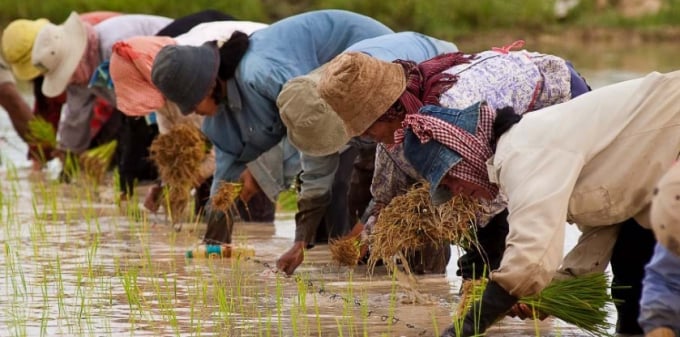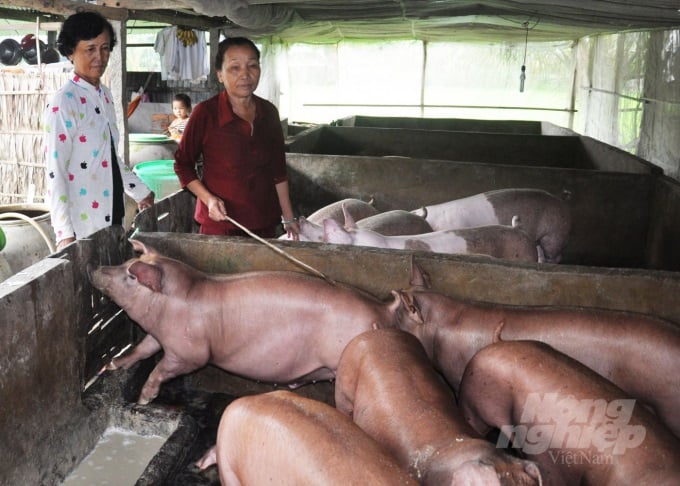May 18, 2025 | 20:18 GMT +7
May 18, 2025 | 20:18 GMT +7
Hotline: 0913.378.918
May 18, 2025 | 20:18 GMT +7
Hotline: 0913.378.918
Within the framework of the Program “Agricultural Transformation and Market Integration in the ASEAN Region: Responding to food security and inclusiveness concerns (AMTI-ASEAN)” organized by funded by the International Fund for Agricultural Development (IFAD), the International Food Policy Research Institute (IFPRI), in collaboration with The Southeast Asian Regional Center for Graduate Study and Research in Agriculture (SEARCA) organized the 2nd High-level Policy Forum 2022 "Transforming food systems in ASEAN Region Post Covid-19: Responding to food security and inclusiveness concerns", taking place on June 1.
Speaking at the opening of the forum, Dr. Tran Cong Thang, Director-General of the Institute of Policy and Strategy for Agriculture and Rural Development (IPSARD), said that this was a program of great significance for ASEAN countries preparing to further participating in the international market.

There are many new opportunities that will affect the agricultural sector in Vietnam and countries in the region. Photo: ATMI - ASEAN.
Dr. Hiroyuki Takeshima, Senior Research Fellow of IFPRI, gave some micro-perspectives on Vietnamese agriculture through the presentation " Agri-food system modernization and smallholders in Southeast Asia: some regional and micro-perspectives”.
In the process of modernizing the agricultural system of Southeast Asian countries, there are also some emerging issues related to sustainable development. Domestic production occupies a dominant position in the context of increasingly open trade, the development trend is shifting towards more protective agricultural policies.
Dr. Takeshima also paid close attention to the existence of smallholder farmers while large farms are increasingly improving in efficiency. “Land reforms in several SEA countries have had mixed effects. In Vietnam, the 1993 Land Law which granted land rights to female had positive effects on education and the health of children. Providing land tenure has also found to be less regressive, as the landlessness increased more among non-poor, rather than the poor, and the central government effectively blocked attempts at land grabbing by local elites. However, at the same time, the land fragmentation has started causing negative effects on overall agricultural productivity in Vietnam.”
Dr. Takeshima believed that Vietnamese farm household’s integration into food market through food purchase can be more effective than food sales because it would crate a cheaper and more diverse food source, and at the same time create more conditions for female members to participate into non-farm labor market. On the other hand, integration will help accelerate both diversification and specialization in agroproduction.
Dr. Takeshima also shared some interesting findings about shifting trends in Vietnam: The proportion of Vietnamese households growing and selling agricultural products has shown signs of decreasing over the years, but there were more food produced and sold in the market. Smallholders were also increasingly purchasing food from the market, but selling fewer number of commodities, which was a sign of specialization in agroproduction.

Domestic production occupies a dominant position in the context of increasingly open trade.
At the forum, Dr. Ganesh Thapa, Former Lead Regional Economist of IFAD, shared some of his thoughts about the binding between institutions and policies in promoting the value chain of agricultural and food products in ASEAN.
“There are still some institutional and policy constraints in the ASEAN region. ASEAN countries have implemented policy reforms to improve the efficiency of agricultural markets, but there are still major challenges for Cambodia, Laos, Myanmar and Vietnam. Common constraints in this group of countries include inadequate infrastructure, limited research and technical education, uncertain land tenure, ineffective law enforcement, weak links among industry value chains. In addition, the small & fragmented landholdings, limited number of farmer organizations, cooperatives, and networks are also obstacles to development.”
Having an insight of the current situation, Dr. Ganesh proposed a number of solutions ASEAN can implement in the future:
Some countries (Cambodia, Lao PDR) are more open to foreign investment policies; but other countries (Indonesia, Philippines, Vietnam) are more limited. ASEAN should work with all members to liberalize foreign investment in agriculture.
Smallholder farmers are disadvantaged in accessing agricultural value chains where farmer organizations and cooperatives are weak. ASEAN and governments should help in organizing and strengthening farmer organizations and cooperatives.
Smallholder households face difficulties in accessing credit, input, information and insurance markets with favorable conditions. Government should promote innovative approaches (e.g. rural business centres, collection cum distribution).
Food safety and quality have become important issues due to market opening. ASEAN needs to focus on solving SPS issues.
Translated by Samuel Pham

(VAN) The decree on Extended Producer Responsibility (EPR) ensures transparent management and disbursement of support funds, avoiding the creation of a “give-and-take” mechanism.

(VAN) Hue City rigorously enforces regulations regarding marine fishing and resource exploitation, with a particular emphasis on the monitoring of fishing vessels to prevent illegal, unreported, and unregulated (IUU) fishing.

(VAN) Hanoi People's Committee has issued a plan on reducing greenhouse gas emissions in the waste management sector with 2030 vision.

(VAN) Vietnam's draft amendment to Decree No. 156 proposes a mechanism for medicinal herb farming under forest canopies, linking economic development to population retention and the sustainable protection and development of forests.

(VAN) In reality, many craft village models combined with tourism in Son La have proven effective, bringing significant economic benefits to rural communities.

(VAN) The international conference titled Carbon Market: International experiences and recommendations for Vietnam was successfully held recently in Ho Chi Minh City.

(VAN) According to the Project on rearranging provincial and communal administrative units, in 2025, the country will have 34 provinces/cities, 3,321 communes, wards, and special zones, and no district-level organization.